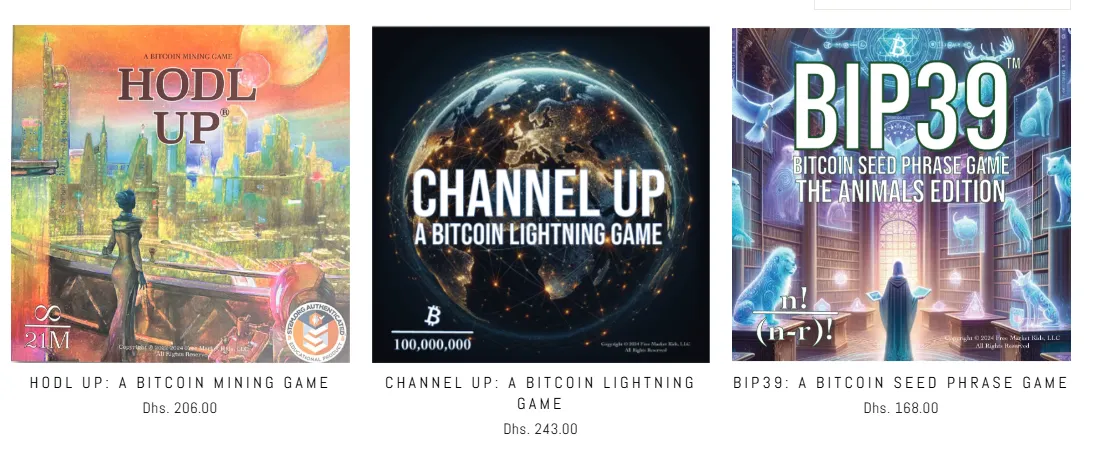Family nights in go Bitcoin with Scott Lindberg
His Lightning Network game, he says, is like something out of sci-fi: 'Have you ever watched the old Star Treks with Spock playing multi-level chess?'

"You have to shut up," Scott Lindberg said with a laugh when asked about playing his Bitcoin-themed board games with newcomers.
"If you are a Bitcoiner and you play this with someone who doesn't know, you have to shut up. Because 90% of people just want to play the game. They just want to have fun," Lindberg told The Crypto Radio.
Founder of Free Market Kids, Lindberg has created a series of board games designed to teach Bitcoin and economic concepts without the jargon. His journey began as a frustrated husband trying to explain cryptocurrency to his busy homeschooling wife and has evolved into a mission to make complex ideas accessible through the universal language of games.
How Bitcoin lessons began at home
Lindberg’s story began at home. "I got excited about [Bitcoin] before the rest of the family, and this became my way of communicating with them," he said. "She was homeschooling, so very busy, and she thought I was crazy. First of all, she was like, 'I just don't have time for your little side interest.'"
Books and podcasts didn’t connect, so Lindberg turned to something more tactile. He began by moving tiles around on the table to show how Bitcoin transactions worked. Those tiles became the seed of his first board game: HODL Up.
"You don't have to know anything [about Bitcoin] when you sit down and play," he said. "But it's in there, and if you have an interest in it, then you can use that to teach."
He likens it to sneaking vegetables into food. "I'm going to try to give them something good and just not let them know it," he laughed.
That philosophy also means resisting the urge to lecture. "Do not try to force it, I highly advise against forcing it," he said. "If they have a question, they're the one that opened the door."
Feedback from his own children has reinforced that lesson. "The kids like it, because they'll yell at each other and say, 'You better put your Bitcoin in cold storage.' It actually sounds like you're playing with treasure," he said. He believes that playful energy is what makes the lessons stick.

HODL Up teaches Bitcoin’s scarcity and difficulty adjustment, Channel Up tackles Lightning payments, and Bit 39 turns seed phrases into a party game. Photo: Free Market Kids
Game theory and incentives
At its core, game theory is about how people make decisions when their choices affect others. In Bitcoin, it explains why miners, node operators, and users act in their own interest but still strengthen the whole system.
“This is what I love about it,” Lindberg said. “There’s not one strategy that will always work when you employ it. So there’s a balance there between luck and planning. And you can’t get away from game theory with Bitcoin, even if you tried.”
That balance shows up in HODL Up, which mirrors Bitcoin’s 21 million cap and difficulty adjustment. “If you’re playing too fast, the difficulty adjustment is going to get more difficult. And that happens in Bitcoin too… from a game theory standpoint, the difficulty adjustment is just brilliant. It’s like a pacemaker,” he said.
Incentives are what tie it all together. “Miners may not have the same exact incentives as a node runner or someone trying to pay somebody else but it just works together that everybody’s incentive is basically to make the network more powerful. So even your enemies are using it, and that actually makes the network stronger.”
The same dynamics surface at the table. “When I played with my nephew, at the time he was 10, and he would always try to help me if I had some bad luck. He would intentionally try to send Bitcoin to me from other players,” he said. While other players can be more aggresive in their tactics: “Maybe you’re playing with Bitcoiners, and they put some real sats on there, and they get really competitive. It just depends on your incentives.”
“Game theory is nothing more than people making the best decision for themselves and their incentives. A tabletop game just simplifies that. You can team up, form a mining pool, or go cutthroat. It’s up to you and what you want to make out of it.”
Inside the game series
Lindberg has created five games so far, each targeting different aspects of economics and Bitcoin:
-
Is That the Best You Can Do? – a negotiation game based on free market principles.
-
HODL Up – focused on Bitcoin scarcity and competition to accumulate the most coins.
-
Channel Up – tackling the Lightning Network. "Have you ever watched the old Star Treks and you got Spock playing with the multi-level chess thing?" Lindberg said. "It's more of an intense game where people are going to be studying which way to route their payments."
-
Bit 39 – a party game about seed phrases, similar to Clue or Pictionary.
-
Fed Up – a critique of the monetary system, where “clowns” win by printing money or adding regulations.
Players often adapt the rules in surprising ways. "Someone's doing really well in the game, they understand the mechanics. Somebody else is struggling, and they'll intentionally do things that would not let them win the most Bitcoin but help that other person have a better experience," Lindberg said.

Is That the Best You Can Do? introduces free market trading, Fed Up pokes fun at money printing, and the series shows how Bitcoin can be taught through play. Photo: Free Market Kids
Distribution hurdles and community play
Despite the creativity, distribution is a challenge. "We do struggle with the cost of shipping to begin with, but then you throw on import duties, tariffs, or any other types of nonsense in there, and a lot of people just look at that and they say, 'Hey, that's too much'," he said.
Events and conferences have helped spread awareness, and Lindberg is eager to build tournaments. "When we play with people who are all already Bitcoiners, they start doing all kinds of inside jargon and bets," he said. "It's completely different."
Those differences in play are part of the charm. Some groups lean into education, others into humor or competition. His daughters gravitate toward lighter games: "My daughters prefer [Bit 39] to the other ones, because it's the least technical."
Whether it’s Bitcoiners making insider jokes or families inventing their own rules, Lindberg sees his games as tools for culture as much as education.
A vision of 21 games
Lindberg’s long-term ambition is to create 21 games in total – echoing Bitcoin’s fixed supply of 21 million coins – with one release per year.
He already sees potential themes everywhere. "In the Bitcoin space, everybody goes from one subject to another – food, energy, fill in the blank. There’s just endless material to make more games," he said.
Austrian economics, energy debates, and Bitcoin history could all inspire future designs.
For Lindberg, the bigger picture is clear: education works best when people don’t realize they’re learning. Through board games, he’s found a way to pass on ideas about money, incentives, and freedom – one family game night at a time.



